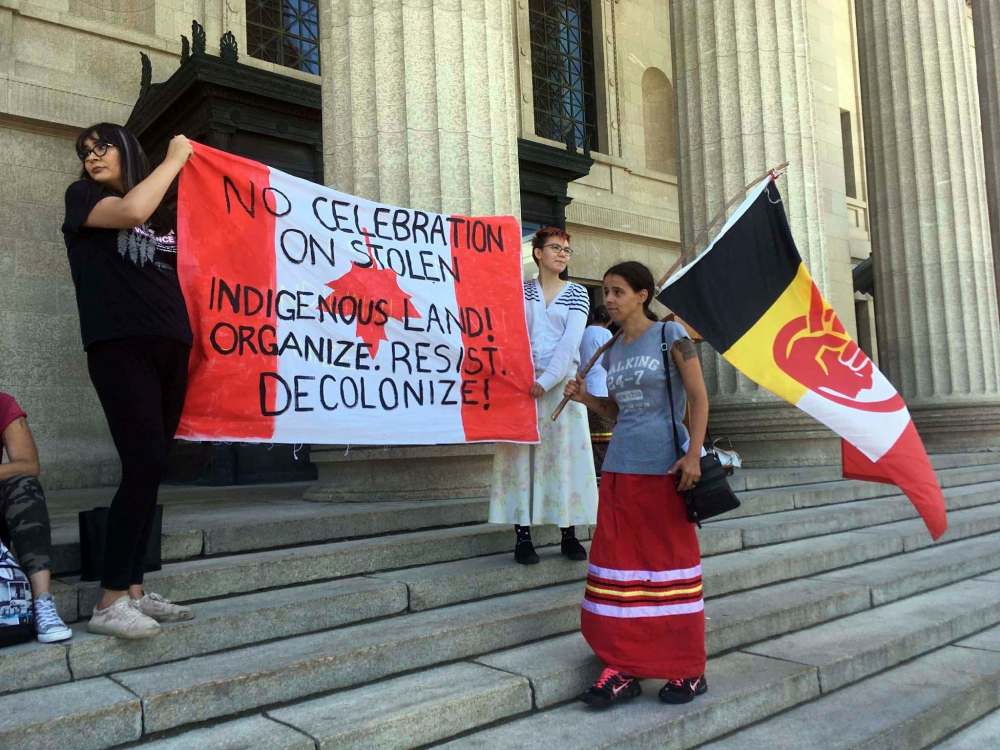For some, watching Canada 150 celebrations hurts
Advertisement
Read this article for free:
or
Already have an account? Log in here »
To continue reading, please subscribe:
Monthly Digital Subscription
$0 for the first 4 weeks*
- Enjoy unlimited reading on winnipegfreepress.com
- Read the E-Edition, our digital replica newspaper
- Access News Break, our award-winning app
- Play interactive puzzles
*No charge for 4 weeks then price increases to the regular rate of $19.00 plus GST every four weeks. Offer available to new and qualified returning subscribers only. Cancel any time.
Monthly Digital Subscription
$4.75/week*
- Enjoy unlimited reading on winnipegfreepress.com
- Read the E-Edition, our digital replica newspaper
- Access News Break, our award-winning app
- Play interactive puzzles
*Billed as $19 plus GST every four weeks. Cancel any time.
To continue reading, please subscribe:
Add Free Press access to your Brandon Sun subscription for only an additional
$1 for the first 4 weeks*
*Your next subscription payment will increase by $1.00 and you will be charged $16.99 plus GST for four weeks. After four weeks, your payment will increase to $23.99 plus GST every four weeks.
Read unlimited articles for free today:
or
Already have an account? Log in here »
Hey there, time traveller!
This article was published 01/07/2017 (3049 days ago), so information in it may no longer be current.
People in red and white milled down Winnipeg’s Osborne Street Saturday, eating food from vendors and drinking in the midday sun. Just around the corner from the festivities, on a quieter street, a sign read “Today your hosts are Treaty 1 First Nations.”
In with the sign and informational flyers, a group of people asked walkers-by to rethink their decision to celebrate Canada 150.
“The 150 years of Canada have been cruel and wretched to the people who were here first. And that is acknowledged a tiny bit, but not enough,” said Kathy Moorhead Thiessen, a spokesperson for the UNSettling Canada 150 movement.

The movement focuses on how Canada’s constitutional framework, established in 1867, took indigenous land and assimilated the people in traumatizing ways. For some indigenous people, watching 150 celebrations hurts.
“I think for many of them it is a slap in the face because there is very little recognition of (the history and current suffering),” Thiessen said.
Thiessen said Manitoba is taking small steps toward reconciliation with its education. The province will be the first to have a First Nations school board and the Success Skills Centre plans to expand its program on indigenous history for newcomers.
“Movement has been made… but there’s a whole swatch of people on this land that don’t know that history. History and present,” she said.
Thiessen pointed to Shoal Lake 40 as an example of present-day suffering. Friday marked day one of construction on Freedom Road, the highway that will reconnect the community to the mainland after Winnipeg’s aqueduct turned it into an island a century ago. The town has had a water boil advisory for 20 years, while the aqueduct in their lake supplies drinking water to Winnipeg.
“That’s unacceptable that they had to live under these conditions for over 100 years so that we could have clean water,” Thiessen said.
She hopes more people will educate themselves on indigenous history and issues.
The crowd gathered outside Manitoba’s legislative building Saturday afternoon did just that.
They listened to indigenous people tell their stories of hardship and resilience.
Vivian Ketchum spoke about feeling alone at Cecilia Jeffrey Indian Residential School, which she attended for three years. She didn’t want to talk about her most painful memories, but recounted being beaten in the hand with her own shoe because she was afraid to go to the dentist for the first time.
“The dreams and ghosts of my past still haunt me sometimes to the points of me wanting to give up,” she said.
Instead of celebrating 150 years of Canada, the crowd celebrated 150 years of resilience.
“We survived the genocide—the residential schools, colonization, assimilation, the reserve system and the treaties,” said Gerry Shingoose, a residential school survivor. “We’re still strong, we’re still willing to share, we’re still beautiful as our ancestors were.”
Shingoose hopes Canada will fully implement the UN Declaration of the Rights of Indigenous People, which recognizes indigenous peoples’ basic human rights, and rights to self-determination, language, health, education, among others.
“We have to respect each other. We have to love each other,” said Sadie Lavoie, a Winnipeg activist from Sagkeeng First Nation.

